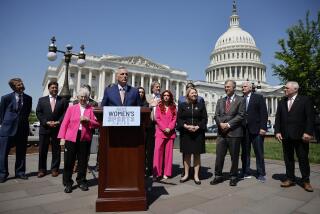Union Objects to Doping Policy
- Share via
The National Basketball Players Assn. said Thursday it is “not thrilled” with a global drug-testing program that will affect potential Olympians because its rules differ from those in the union’s collective bargaining agreement with the NBA. It plans to outline its reservations in a letter to USA Basketball, the sport’s national governing body in the U.S., “in the near future,” union spokesman Dan Wasserman said.
NBA players have participated in the Olympic tournament since 1992, but a global anti-doping code endorsed Wednesday by 65 sports federations and 73 governments will subject all players in a pool of Olympic candidates to random, out-of-competition testing. All candidates must have a negative test on record within 120 days of the Athens Olympics.
Because the U.S. finished out of the top three in last year’s world championships, it must earn an Olympic berth through a qualifying tournament in August in Puerto Rico. Participants in that tournament will be subject to World Anti-Doping Agency rules. Professional leagues in North America aren’t obliged to accept the code because they’re not under the jurisdiction of international sports federations. However, the leagues have been encouraged to comply.
“We are not satisfied with the expanded drug-testing policy as proposed, and we intend to forward a formal response detailing our position to USA Basketball,” Wasserman said Thursday. “It’s the whole package.”
Wasserman acknowledged NBA players have been tested before international tournaments, such as last year’s world championships in Indianapolis, the 2001 Pan Am Games and the 2000 Sydney Olympics, and the union did not object.
“To the extent that players were tested last year at the world championships, we did not opine, but it’s not like we approve of the process that took place last summer,” he said. “The [new] policy, as we’ve seen it, is not satisfactory. The players’ association is concerned about the discrepancies between the drug-testing agreement we have in place with the NBA and what is stated here.”
Craig Miller, a spokesman for USA Basketball, said his organization had not heard from the players’ association and was unaware the union had objections to the anti-doping code. Billy Hunter, the union’s executive director, is a member of USA Basketball’s board of directors and an ex-officio participant of the senior men’s national team committee.
“This isn’t any different than what we’ve been doing since 2001, and our players have fully cooperated,” Miller said.
The NHL Players’ Assn. objected to testing procedures before the Salt Lake City Winter Games, but a compromise was reached that ensured players were not distracted by tests at crucial times. As a result, they weren’t tested until after the 2001 Stanley Cup finals. They were also educated about substances such as ephedrine, a stimulant that is not banned by the NHL but is banned by the International Olympic Committee.
Sources said Don Fehr, head of the baseball players’ union, has also expressed concern about the differences in drug policy between the IOC and Major League Baseball, concerns that could prevent baseball players from participating in the Olympics in large numbers. Major League Baseball does not ban ephedrine, which was linked to the death last month of Baltimore Oriole pitcher Steve Bechler.
More to Read
Go beyond the scoreboard
Get the latest on L.A.'s teams in the daily Sports Report newsletter.
You may occasionally receive promotional content from the Los Angeles Times.







